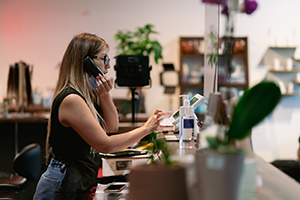Dreaming of starting your own photography business but don’t know where to start? Here’s a look at some of the essentials you’ll need to start a photography business, plus how those tools can help you be successful.
Starting your own business is a daunting but exciting challenge, and one you’ve likely been dreaming of for a while. Launching a photography business is a great way to bring in extra income and can even grow to a fulltime gig—but you may be wondering where to start. From having the right tools to tackle all aspects of your business to setting goals building strategies, here’s how to get your new photography business started:
How to write a plan for your photography business
Starting a photography business is a big endeavor, and you’ll have to be committed and take your business venture seriously for it to be successful. It helps to think of photography no longer as a hobby, but as your work. You’re not a freelancer, you’re a business owner.
Your photography business plan should answer the following questions:
- Your vision: What does a future as a successful photographer look like?
- Your mission: Why are you pursuing this venture?
- Objectives and strategies: What are your goals, and specifically what will it take to get you there?
- The budget: What will it cost to get started, and what will it cost to maintain? What should you charge to profit from your photography business?
How much does it cost to start a photography business?
While the type of photography you do will affect the cost (for example, being a wedding photographer is typically more expensive than shooting portraits), the average estimated cost for starting a photography business is around $10,000.
How much should I charge as a first-time photographer?
First-time professional photographers usually charge between $75 all the way up to $300 an hour, depending on their level of education, training and skill. Other photographers choose to charge per final edited image, with cost ranging from $50-$350 an image. Some photographers choose to offer a lower rate for editing versus shooting but watch that you aren’t underestimating your charges—editing a photo can take between 5-30 minutes, depending on how much post-production you need to do.
Set up a separate bank account for your photography business
In the spirit of taking your business venture seriously, set up a separate bank account for all your business-related expenses and payments; that way money management will be much easier as your business grows, not to mention less stressful during tax season.
Source the photography equipment you need
If you’re starting your own photography business you likely already own key pieces of equipment, such as a digital SLR camera, a few lens options and a tripod. At this point in your business journey, you should be actively trying to avoid debt when possible. Don’t go overboard buying lighting kits, backdrops and other pricey purchases until you can afford them. In addition to photo-capturing equipment, you’ll also need backup hard drives, extra SD cards and quality photo-editing software.
There are equipment needs outside of just photography gear to keep in mind, too. The “business side” of your company will require certain tools as well, like accounting software and payment-acceptance hardware. For individuals just starting out their business, there are plenty of affordable (sometimes free) tools at your disposal. A mobile POS (point-of-sale) system will cover your invoicing and payment acceptance needs when coupled with a travel-sized card reader. Mobile POS software operates on your phone, so you can collect payment on the spot rather than emailing an invoice.
When choosing merchant payment services, look for providers that will scale with you. While you are just one person now, you may expand your business later by hiring a photography assistant, bookkeeper or a second shooter. Look for accounting and POS tools that will grow with you, allowing you to have multiple points of sale and cloud-based access to business essentials.
Insure your photography equipment
For professional photographers, your camera is your lifeline. Imagine a possible scenario where you’re shooting a family portrait outdoors. Your camera is sitting on your tripod, and you look away for a moment just as a heavy gust of wind brings the tripod crashing to the ground, camera and all. Having your equipment insured means the difference between being out of work while you save for a new camera or getting back to business quickly.
Consult a legal advisor
Any seasoned photographer knows that accidents happen. That’s why contracts exist—to protect you in case of accident, like files getting corrupted or SD cards mysteriously disappearing. To protect you and your business, seek the services of a legal advisor to help you in writing a standard contract to protect you from being sued in case of an accident; this is especially important if you’re photographing one-time only events like weddings.
You will also need legal advice on payment collection and cancellation policies. It’s very important that you create concrete payment guidelines up front, and that you keep the rules you set. While hiring a lawyer does come at a financial cost, having certainty that your contracts and insurance forms are correct can prevent you from more difficult legal work later. Plus, if you do have to enact any part of your contract, you will have legal aid on the ready.
Register your photography business
The final step in setting up a photography business is to register it. There are many ways you can register a business, but for a solo venture, there are essentially two options to choose from:
- Sole proprietorship: This is the easiest way to register, but it also puts you in a more vulnerable position. With sole propriety, in the event that you are served a lawsuit, all your personal assets become liable, like your car or home
- Limited liability company (LLC): Registering your photography business as an LLC will remove your personal assets from liability and instead, as just the LLC is responsible in case of a lawsuit.
Starting a photography business is challenging. Starting any new business is stressful, but with thoughtful prep work, strategic planning, reliable advice and plenty of hard work, you could turn your passion for photography into your life’s work.
Learn more about merchant services available through U.S. Bank for new business owners.











































